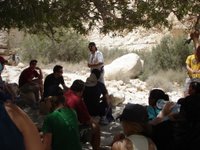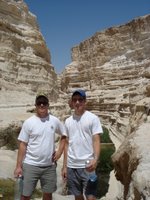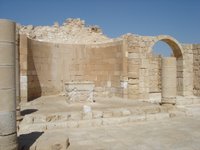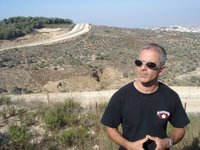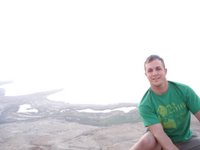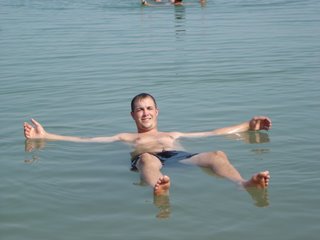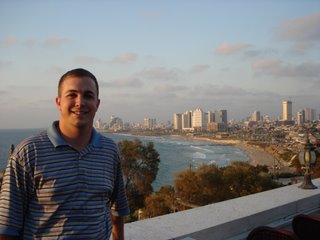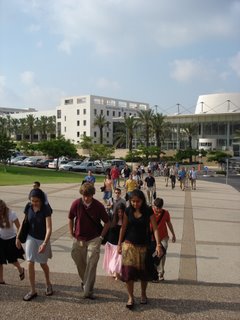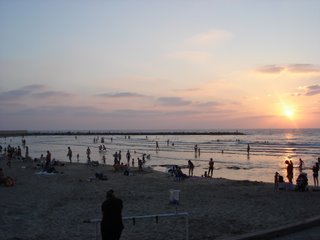The last “diary” entry I posted was after the second day of lectures, so I will fill you in from that point. We had a third day of lectures last Wednesday, and we heard from five speakers.
The first speaker of the morning was the former Chief of Global Operations of Mosad, in other words, the third person in charge of the Israeli equivalent of the CIA. He spoke to us about the role of intelligence in combating terrorism.
The second speaker was Dr. David Menashri, a professor at Tel Aviv University and an expert in Iran, and he spoke about, as you might have guessed, Iran. He offered some interesting insights into the Irani president, Ahjamenidad.
The third speaker was Dr. Azani Eitan, and he spoke to us about financing terrorism. This lecture took on great importance in light of the recent article in the NY Times exposing the US program for breaking down the financial networks of terrorist organizations.
An Israeli Defense Forces JAG lawyer, Lt Col David Benjamin, spoke to us in our fourth lecture about the legal implications of fighting terrorism. One interesting fact about the Israeli legal system is that anyone, terrorists included, are allowed to bring charges before the supreme court in order to prevent the IDF from acting in a certain way. For instance, in order to prevent a fire fight and casualties, the IDF would surround the house of a terrorist and have the neighbor ask the terrorist to come out and turn himself over to the IDF to great success. The supreme court ruled that this endangers life of the neighbor, and they are no longer allowed to use this tactic. Unfortunate, but this is the way it is.
Finally, we heard from the Indian ambassador to Israel who spoke to us about the fight against terrorism in India. If nothing else, he made one thing clear: India does not like Pakistan.
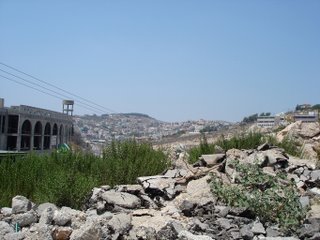 This day of lectures concluded the classroom portion of the trip. Beginning on Thursday, we headed to the field for a trip to an Arab-Israeli town, Umm El-Fahem, where we enjoyed an authentic Arab meal and spoke to the city manager, Dafik. His point-of-view was quite interesting, rather bothersome, and pretty hypocritical. Basically, though he didn’t say it in so many words, as far as he is concerned, he is Arab first and Israeli second. Th
This day of lectures concluded the classroom portion of the trip. Beginning on Thursday, we headed to the field for a trip to an Arab-Israeli town, Umm El-Fahem, where we enjoyed an authentic Arab meal and spoke to the city manager, Dafik. His point-of-view was quite interesting, rather bothersome, and pretty hypocritical. Basically, though he didn’t say it in so many words, as far as he is concerned, he is Arab first and Israeli second. Th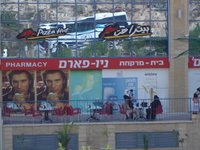 is is problematic because, while he enjoys the democracy that he lives under in Israel and the benefits afforded him as a result, he applauds the courage and creativity of the Arab militants who stand up to the strongest military force in the region. What he calls courage, I would call cowardice. What he calls creativity, I would call the murder of civilians. Those who he calls militants can be called nothing but what they really are: terrorists. (Many of you might now be wondering what the difference is between a freedom fighter/militant and a terrorist. I recommend reading the article “Defining Terrorism” linked on the right. I’ll try to make this the subject of a future entry as well.)
is is problematic because, while he enjoys the democracy that he lives under in Israel and the benefits afforded him as a result, he applauds the courage and creativity of the Arab militants who stand up to the strongest military force in the region. What he calls courage, I would call cowardice. What he calls creativity, I would call the murder of civilians. Those who he calls militants can be called nothing but what they really are: terrorists. (Many of you might now be wondering what the difference is between a freedom fighter/militant and a terrorist. I recommend reading the article “Defining Terrorism” linked on the right. I’ll try to make this the subject of a future entry as well.)
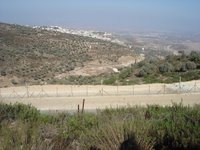 After speaking to this man, he escorted us to the security fence that separates Israel and Palestine, specifically the West Bank. It is often called a “security wall” in the media, but this is inappropriate since less than 20% of this barrier is actually a wall, and, in those places there has been a problem with bullets flying across the border. Unlike a fence that you would put
After speaking to this man, he escorted us to the security fence that separates Israel and Palestine, specifically the West Bank. It is often called a “security wall” in the media, but this is inappropriate since less than 20% of this barrier is actually a wall, and, in those places there has been a problem with bullets flying across the border. Unlike a fence that you would put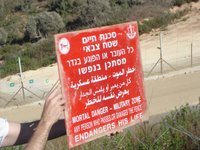 in your yard to contain a dog, this fence is not designed to be a physical barrier. The way it is built actually makes it quite easy to climb. Nor is it physically monitored by the IDF. It is fitted with sensors that, when touched, alert the IDF who are able to respond within minutes. There is also a unit of Bedouins in the IDF who are expert trackers who inspect the 15’ strip of dirt beside the fence for disturbance.
in your yard to contain a dog, this fence is not designed to be a physical barrier. The way it is built actually makes it quite easy to climb. Nor is it physically monitored by the IDF. It is fitted with sensors that, when touched, alert the IDF who are able to respond within minutes. There is also a unit of Bedouins in the IDF who are expert trackers who inspect the 15’ strip of dirt beside the fence for disturbance.
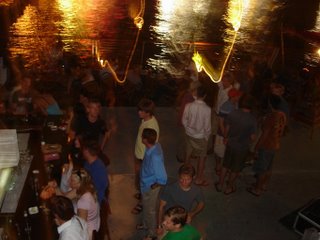 Following this we returned to the hotel, and like every night, enjoyed the Tel Aviv night life at the beach and along the boardwalk.
Following this we returned to the hotel, and like every night, enjoyed the Tel Aviv night life at the beach and along the boardwalk.
I will leave it at this for now because I don’t want you to get overwhelmed, but I have some other entries ready to be posted from my weekend in southern Israel and some responding to the questions some of you asked me about my lectures. Take care.
